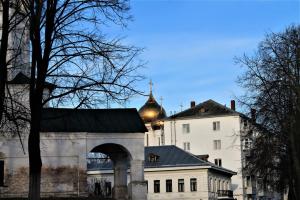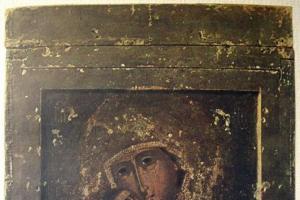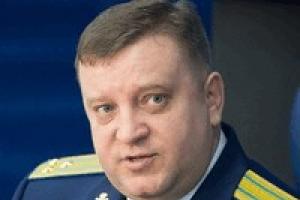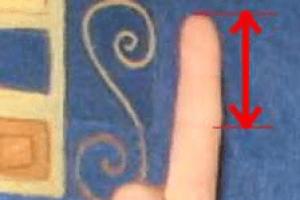 About forty years ago I met Sergei Iosifovich. He was then a student at the Department of Applied Linguistics at the Moscow Institute of Foreign Languages. Already at that time, all teachers were aware of his originality - remarkable success in his studies, depth of judgment beyond his years and, most importantly, devotion to Russian literature (Bryusov in particular). It was clear that Sergei Iosifovich Gindin was created for science, for that science that did not attract many in those years - for philology.
About forty years ago I met Sergei Iosifovich. He was then a student at the Department of Applied Linguistics at the Moscow Institute of Foreign Languages. Already at that time, all teachers were aware of his originality - remarkable success in his studies, depth of judgment beyond his years and, most importantly, devotion to Russian literature (Bryusov in particular). It was clear that Sergei Iosifovich Gindin was created for science, for that science that did not attract many in those years - for philology.
It's nice to know that these expectations were not disappointed. Despite all the obstacles and accidents that life set up, Sergei Iosifovich became a great scientist. Tracing his scientific trajectory is the task of a separate essay (and much more still lies ahead). I will only note that the depth of scientific thought, the breadth of erudition, combined with thoroughness and unhurriedness, with amazing exactingness towards himself and others, earned him universal respect in our country and abroad.
Let us wish our hero of the day health and new successes in science, in teaching, and in the education of future philologists.
Professor A.Ya. SHAYKEVICH,
Head of the Machine Fund Department
Institute of Russian Language RAS
 I have known Sergei Iosifovich Gindin for more than thirty years. And for me he is not Sergei Iosifovich, but Seryozha, a wonderful person and an excellent specialist. His specialties are very diverse: he is a linguist, a textual critic, a high-quality publisher and commentator on literary and linguistic texts - and their researcher, a professional editor, and an expert in archival affairs. His works “on Bryusov” are highly valued by literary critics and specialists in the field of the language of poetry. And he himself is a very modest person, with a quiet, intelligent voice, who knows how to listen carefully to his interlocutor, without imposing his opinion on him. But he is also an interesting storyteller. And a university professor, captivating the audience with his deep knowledge of the subject combined with the non-triviality of the proposed interpretations.
I have known Sergei Iosifovich Gindin for more than thirty years. And for me he is not Sergei Iosifovich, but Seryozha, a wonderful person and an excellent specialist. His specialties are very diverse: he is a linguist, a textual critic, a high-quality publisher and commentator on literary and linguistic texts - and their researcher, a professional editor, and an expert in archival affairs. His works “on Bryusov” are highly valued by literary critics and specialists in the field of the language of poetry. And he himself is a very modest person, with a quiet, intelligent voice, who knows how to listen carefully to his interlocutor, without imposing his opinion on him. But he is also an interesting storyteller. And a university professor, captivating the audience with his deep knowledge of the subject combined with the non-triviality of the proposed interpretations.
In a word, Seryozha has a lot of talents. And on the day of his anniversary, I wish him good health, the strength necessary for work in the newspaper “Russian Language”, so valued by teachers and linguists, and for lecturing to students, and for scientific creativity, and simply for life.
Many years!
Professor L.P. KRYSIN,
deputy Director of the Russian Language Institute of the Russian Academy of Sciences
 Dear Sergei Iosifovich!
Dear Sergei Iosifovich!
Together with our colleagues at the Institute of Linguistics of the Russian State University for the Humanities, we congratulate you on your anniversary. One can only be surprised at how you manage to combine seemingly incompatible things: intensive scientific work, participation in conferences and round tables, heading a department, editing the Moscow Linguistic Journal, teaching and scientific supervision of undergraduate and graduate students (I’m sure I forgot something!). One can only admire how you overcome the daily routine of tasks, preserving strength and energy for something more important. That is why for our students you are an example of a scientist and intellectual in the highest sense of these words.
I am glad that I work next to you, I value our communication and hope that it is mutual. I always listen to you with great respect and pleasure (at conferences, meetings, just over a cup of tea) and, as in my student years, I continue to study.
Yours sincerely,
Maxim KRONGAUZ,
Professor, Director of the Institute of Linguistics of the Russian State University for the Humanities
 Together with Sergei Iosifovich Gindin - for us just Seryozha - we have been working in the newspaper "Russian Language" since its founding. Sergei Iosifovich makes a significant and invaluable contribution to the creation of the newspaper. Thanks to his encyclopedic knowledge, we publish unique works by outstanding linguists, philologists, and psychologists that have not been republished for many years. On the pages of the newspaper he appears as a linguist, as a literary critic, as an editor, and as a teacher.
Together with Sergei Iosifovich Gindin - for us just Seryozha - we have been working in the newspaper "Russian Language" since its founding. Sergei Iosifovich makes a significant and invaluable contribution to the creation of the newspaper. Thanks to his encyclopedic knowledge, we publish unique works by outstanding linguists, philologists, and psychologists that have not been republished for many years. On the pages of the newspaper he appears as a linguist, as a literary critic, as an editor, and as a teacher.
A keen connoisseur of poetic texts, Sergei Iosifovich introduces readers to the work of famous and unknown poets.
We always admire the enormous erudition of our scientific editor, the depth of thought, the choice of authors and, of course, the impeccable style.
And one more thing: respectful, careful attention not only to those about whom he writes, but also to everyone around him, especially to his colleagues.
We are very glad that we work with Seryozha in the same editorial office, and we value our cooperation.
Dear Seryozha, happy birthday, happy anniversary! Health, strength and creative success!
Lyudmila GONCHAR –
from the editors of the newspaper "Russian Language"
 Dear Sergei Iosifovich!
Dear Sergei Iosifovich!
Thank you for your lectures, which you gave at our school for many years in a row, showing high school students how responsibly and lovingly you can treat the poetic word.
Thank you for your publications, without which it is no longer possible to imagine studying the work of Bryusov and his contemporaries.
Thank you for your work - high-class philology.
Happy birthday!
Lev SOBOLEV –
on behalf of students, graduates and language specialists
gymnasium No. 1567 in Moscow
 To our teacher
To our teacher
We had the great fortune to study with Sergei Iosifovich. An outstanding linguist and amazing teacher, he communicates with his students with extraordinary dedication and sincerity. Learning from Sergei Iosifovich is always exciting and joyful, listening to him is always interesting. And, what is very important, Sergei Iosifovich does not tolerate dishonest work; he teaches students to approach any task seriously, think critically and work responsibly.
Sergey Iosifovich, we want to thank you very much for the knowledge that you passed on to us, for the joy of meeting you, for your warmth and care. We sincerely congratulate you on your anniversary and wish you happiness, health and further scientific and creative success.
Anya KRASNIKOVA,
Masha GARDER,
Inna ZHAVAEVA –
graduate students and department staff
theoretical and applied linguistics
Institute of Linguistics, Russian State University for the Humanities
 Happy anniversary to our thoughtful editor, meticulous proofreader, conscientious author and encyclopedically educated beloved editor-in-chief! Any business rests on people who put their strength and soul into it. “Moscow Linguistic Journal” is in fact Sergei Iosifovich Gindin, a talented scientist, an attentive teacher and simply a very kind person.
Happy anniversary to our thoughtful editor, meticulous proofreader, conscientious author and encyclopedically educated beloved editor-in-chief! Any business rests on people who put their strength and soul into it. “Moscow Linguistic Journal” is in fact Sergei Iosifovich Gindin, a talented scientist, an attentive teacher and simply a very kind person.
The variety of topics in the journal, as well as the scientific level of the articles, reflect the depth and versatility of his scientific interests, and the team of authors, including professors and students, suggests that it is not enough to just be a great scientist, you must also be able to be a great friend. When all these qualities are combined in one person, then art, talent, creation And creation cease to be “concepts”, but become embodied in deeds, in life.
Please always be healthy and happy, sympathetic and witty, kind and attentive to the delight of your many friends, students and colleagues!
Natasha SEMENOVA –
from the editors of the Moscow Linguistic Journal
Russian linguist
Specialist in text linguistics, poetics, linguistic problems of computer science, history of Russian philology (especially in the scientific heritage of G. O. Vinokur, N. I. Zhinkin, M. V. Panova, Yu. S. Martemyanov, N. I. Lepskoy), the works of V. Ya. Bryusov, Russian poetry of the early 20th century.
At RSUH since 1991.
Gives courses of lectures: “Linguistics of text”, “Typology and stratification of speech”, “Introduction to the theory of text”, “Philological support of communication”, “Introduction to general philology”.
Member of the Moscow Linguistic Society, leader of the permanent seminar “Problems of Text”.
Honorary member of the International Prosodic Association "Eidos" (Hawaii).
Editor of the Moscow Linguistic Journal (since 2001) and the newspaper First of September (since 1997).
Main publications
- Connected text: formal definition and elements of typology / USSR Academy of Sciences. Institute rus. language M., 1971. 44 p.
- Experiences in analyzing text structure using semantic dictionaries // Machine translation and applied linguistics. Vol. 167. M., 1972. P. 42-112.
- [Comp.]: Structure of poetic speech: Syst. decree. lit. in general and Russian poetry / USSR Academy of Sciences. Institute rus. language M., 1976-1982. Vol. 1-6.
- Problems of analysis and synthesis of whole text in machine translation systems, information and dialogue systems / All-Union. translation center M., 1978. 83 p. Co-author Leontyeva N. N.
- Positional methods for automatic text fragmentation... // Semiotics and computer science. 1978. Vol. 10. pp. 32-73.
- What is a Text as a Basic Notion of Text Linguistics // Text as Sentence Continued. Hamburg, 1981, pp. 107-111.
- Biography in the structure of letters and epistolary behavior // Language and personality. M., 1989. pp. 62-77.
- Comp., scientific. prepared text, commentary: Foreign poetry in translations by Valery Bryusov. M.: Raduga, 1994. 394 p.
- G. O. Vinokur in search of the essence of philology // Izv. Academician Sci. Ser. lit. and language. 1998. T. 57, No. 2. P. 3-18.
- Rep. ed. (together with N. N. Rozanova): Language. Culture. Humanitarian knowledge: Scientific. legacy of G. O. Vinokur and modernity / RAS. Institute rus. language them. Vinogradova. M.: Scientific. world, 1999. 485 p.
Sergei Iosifovich Gindin(born September 11, 1945) - Russian linguist. Candidate of Philological Sciences (1974), Associate Professor (1993), Head of the Department of Theoretical and Applied Linguistics at the Institute of Linguistics of the Russian State University for the Humanities.
Graduate of the Department of Applied Linguistics, Translation Faculty, Moscow Pedagogical Institute of Foreign Languages (1968).
Senior researcher at the Department of Corpus Linguistics and Linguistic Poetics of the Institute of Russian Language of the Russian Academy of Sciences.
Specialist in text linguistics, poetics, linguistic problems of computer science, history of Russian philology (especially in the scientific heritage of G. O. Vinokur, N. I. Zhinkin, M. V. Panova, Yu. S. Martemyanov, N. I. Lepskaya), the works of V. Ya. Bryusov, Russian poetry of the early 20th century.
At RSUH since 1991.
Gives courses of lectures: “Linguistics of text”, “Typology and stratification of speech”, “Introduction to the theory of text”, “Philological support of communication”, “Introduction to general philology”.
Member of the Moscow Linguistic Society, leader of the permanent seminar “Problems of Text”.
Honorary member of the International Prosodic Association "Eidos" (Hawaii).
Editor of the Moscow Linguistic Journal (since 2001) and the newspaper First of September (since 1997).
Main publications- Connected text: formal definition and elements of typology / USSR Academy of Sciences. Institute rus. language M., 1971. 44 p.
- Experiences in analyzing text structure using semantic dictionaries // Machine translation and applied linguistics. Vol. 167. M., 1972. P. 42-112.
- : Structure of poetic speech: Syst. decree. lit. in general and Russian poetry / USSR Academy of Sciences. Institute rus. language M., 1976-1982. Vol. 1-6.
- Problems of analysis and synthesis of whole text in machine translation systems, information and dialogue systems / All-Union. translation center M., 1978. 83 p. Co-author Leontyeva N. N.
- Positional methods for automatic text fragmentation... // Semiotics and computer science. 1978. Vol. 10. pp. 32-73.
- What is a Text as a Basic Notion of Text Linguistics // Text as Sentence Continued. Hamburg, 1981, pp. 107-111.
- Biography in the structure of letters and epistolary behavior // Language and personality. M., 1989. pp. 62-77.
- Comp., scientific. prepared text, commentary: Foreign poetry in translations by Valery Bryusov. M.: Raduga, 1994. 394 p.
- G. O. Vinokur in search of the essence of philology // Izv. Academician Sci. Ser. lit. and language. 1998. T. 57, No. 2. P. 3-18.
- Rep. ed. (together with N. N. Rozanova): Language. Culture. Humanitarian knowledge: Scientific. legacy of G. O. Vinokur and modernity / RAS. Institute rus. language them. Vinogradova. M.: Scientific. world, 1999. 485 p.
Sergei Iosifovich Gindin(born September 11) - Russian linguist. Candidate of Philological Sciences (1974), Associate Professor (1993), Head of the Department of Theoretical and Applied Linguistics at the Institute of Linguistics of the Russian State University for the Humanities.
Graduate of the Department of Applied Linguistics, Faculty of Translation (1968).
Senior Researcher at the Department of Corpus Linguistics and Linguistic Poetics.
Main publications
- Connected text: formal definition and elements of typology / USSR Academy of Sciences. Institute rus. language M., 1971. 44 p.
- Experiences in analyzing text structure using semantic dictionaries // Machine translation and applied linguistics. Vol. 167. M., 1972. P. 42-112.
- [Comp.]: Structure of poetic speech: Syst. decree. lit. in general and Russian poetry / USSR Academy of Sciences. Institute rus. language M., 1976-1982. Vol. 1-6.
- Problems of analysis and synthesis of whole text in machine translation systems, information and dialogue systems / All-Union. translation center M., 1978. 83 p. Co-author Leontyeva N. N.
- Positional methods for automatic text fragmentation... // Semiotics and computer science. 1978. Vol. 10. pp. 32-73.
- What is a Text as a Basic Notion of Text Linguistics // Text as Sentence Continued. Hamburg, 1981, pp. 107-111.
- Biography in the structure of letters and epistolary behavior // Language and personality. M., 1989. pp. 62-77.
- Comp., scientific. prepared text, commentary: Foreign poetry in translations by Valery Bryusov. M.: Raduga, 1994. 394 p.
- G. O. Vinokur in search of the essence of philology // Izv. Academician Sci. Ser. lit. and language. 1998. T. 57, No. 2. P. 3-18.
- Rep. ed. (together with N. N. Rozanova): Language. Culture. Humanitarian knowledge: Scientific. legacy of G. O. Vinokur and modernity / RAS. Institute rus. language them. Vinogradova. M.: Scientific. world, 1999. 485 p.
About him
- (photo there too).
Write a review of the article "Gindin, Sergei Iosifovich"
An excerpt characterizing Gindin, Sergei Iosifovich
Her funny face again shone with all shades of joy:– Are you really, really going to come?! – she squealed happily.
“I really, really will come...” I firmly promised...
The days, loaded to the brim with everyday worries, turned into weeks, and I still could not find free time to visit my sweet little friend. I thought about her almost every day and swore to myself that tomorrow I would definitely find time to “unwind my soul” for at least a couple of hours with this wonderful, bright little man... And also another, very strange thought did not give me peace - very I wanted to introduce Stella’s grandmother to my no less interesting and unusual grandmother... For some inexplicable reason, I was sure that both of these wonderful women would definitely find something to talk about...
So, finally, one fine day I suddenly decided that I would stop putting everything off “for tomorrow” and, although I was not at all sure that Stella’s grandmother would be there today, I decided that it would be wonderful if today I finally visited I’ll introduce my new girlfriend, and if I’m lucky, I’ll introduce our dear grandmothers to each other.
Some strange force literally pushed me out of the house, as if someone from afar was very softly and, at the same time, very persistently mentally calling me.
I quietly approached my grandmother and, as usual, began to hover around her, trying to figure out how best to present all this to her.
“Well, shall we go or something?” the grandmother asked calmly.
I stared at her dumbfounded, not understanding how she could find out that I was even going somewhere?!
Grandmother smiled slyly and, as if nothing had happened, asked:
“What, don’t you want to walk with me?”
In my heart, outraged by such an unceremonious invasion into my “private mental world,” I decided to “test” my grandmother.
- Well, of course I want to! – I exclaimed joyfully, and without saying where we would go, I headed towards the door.
– Take a sweater, we’ll be back late – it’ll be cool! – the grandmother shouted after him.
I couldn't stand it any longer...
- And how do you know where we are going?! – I ruffled my feathers like a frozen sparrow and muttered offendedly.
“It’s all written all over your face,” the grandmother smiled.
Of course, it wasn’t written on my face, but I would give a lot to find out how she always knew everything so confidently when it came to me?
A few minutes later we were already stomping together towards the forest, enthusiastically chatting about the most diverse and incredible stories, which she, naturally, knew much more than I did, and this was one of the reasons why I loved walking with her so much.
It was just the two of us, and there was no need to be afraid that someone would overhear and someone might not like what we were talking about.
Grandmother very easily accepted all my oddities and was never afraid of anything; and sometimes, if she saw that I was completely “lost” in something, she gave me advice to help me get out of this or that undesirable situation, but most often she simply observed how I reacted to life’s difficulties, which had already become permanent, without finally came across on my “spiked” path. Lately it has begun to seem to me that my grandmother is just waiting for something new to come along, in order to see if I have matured at least a heel, or if I am still “stuck away” in my “happy childhood”, not wanting to get out of my short childhood shirts. But even for her “cruel” behavior, I loved her very much and tried to take advantage of every convenient moment to spend time with her as often as possible.
The forest greeted us with the welcoming rustle of golden autumn leaves. The weather was magnificent, and one could hope that my new friend, by “luck,” would also be there.
I picked a small bouquet of some modest autumn flowers that still remained, and a few minutes later we were already next to the cemetery, at the gate of which... in the same place sat the same miniature sweet old lady...
- And I already thought I couldn’t wait for you! – she greeted joyfully.
My jaw literally dropped from such surprise, and at that moment I apparently looked quite stupid, because the old woman, laughing cheerfully, came up to us and affectionately patted me on the cheek.
Sergei Iosifovich Gindin(born September 11) - Russian linguist. Candidate of Philological Sciences (1974), Associate Professor (1993), Head of the Department of Theoretical Linguistics at the Institute of Linguistics of the Russian State University for the Humanities.
Senior researcher at the Department of Corpus Linguistics and Linguistic Poetics of the Institute of Russian Language of the Russian Academy of Sciences.
Specialist in text linguistics, poetics, linguistic problems of computer science, history of Russian philology (especially in the scientific heritage of G. O. Vinokur, N. I. Zhinkin, M. V. Panova, Yu. S. Martemyanov, N. I. Lepskoy), the works of V. Ya. Bryusov, Russian poetry of the early 20th century.
At RSUH since 1991.
Gives courses of lectures: “Linguistics of text”, “Typology and stratification of speech”, “Introduction to the theory of text”, “Philological support of communication”, “Introduction to general philology”.
Member of the Moscow Linguistic Society, leader of the permanent seminar “Problems of Text”.
Honorary member of the International Prosodic Association "Eidos" (Hawaii).
Editor of the Moscow Linguistic Journal (since 2001) and the newspaper First of September (since 1997).
Main publications
- Connected text: formal definition and elements of typology / USSR Academy of Sciences. Institute rus. language M., 1971. 44 p.
- Experiences in analyzing text structure using semantic dictionaries // Machine translation and applied linguistics. Vol. 167. M., 1972. P. 42-112.
- [Comp.]: Structure of poetic speech: Syst. decree. lit. in general and Russian poetry / USSR Academy of Sciences. Institute rus. language M., 1976-1982. Vol. 1-6.
- Problems of analysis and synthesis of whole text in machine translation systems, information and dialogue systems / All-Union. translation center M., 1978. 83 p. Co-author Leontyeva N. N.
- Positional methods for automatic text fragmentation... // Semiotics and computer science. 1978. Vol. 10. pp. 32-73.
- What is a Text as a Basic Notion of Text Linguistics // Text as Sentence Continued. Hamburg, 1981, pp. 107-111.
- Biography in the structure of letters and epistolary behavior // Language and personality. M., 1989. pp. 62-77.
- Comp., scientific. prepared text, commentary: Foreign poetry in translations by Valery Bryusov. M.: Raduga, 1994. 394 p.
- G. O. Vinokur in search of the essence of philology // Izv. Academician Sci. Ser. lit. and language. 1998. T. 57, No. 2. P. 3-18.
- Rep. ed. (together with N. N. Rozanova): Language. Culture. Humanitarian knowledge: Scientific. legacy of G. O. Vinokur and modernity / RAS. Institute rus. language them. Vinogradova. M.: Scientific. world, 1999. 485 p.
About him
- To the 60th anniversary of S.I. Gindin (photo there).
Categories:
- Personalities in alphabetical order
- Scientists by alphabet
- Born on September 11
- Born in 1945
- Linguists of Russia
- Semasiologists
- Moscow scientists
- Applied linguists
- RSUH teachers
- MSU teachers
- Russianists
- Literary scholars of Russia
- Literary scholars of the USSR
- Philologists of Russia
- Poetry scholars
- MSLU graduates
Wikimedia Foundation. 2010.
- Gindin, Leonid Alexandrovich
- Hindu Kush religion
See what “Gindin, Sergey Iosifovich” is in other dictionaries:
Gindin- Gindin, Alexander Sheftelyevich Russian pianist Gindin, Leonid Aleksandrovich (d. 1994) Soviet linguist, Indo-Europeanist Gindin, Mikhail Efimovich Russian cinematographer, cameraman, teacher, twice winner of the Stalin Prize Gindin, Sergei... ... Wikipedia
Laureates of the Stalin Prize in the field of literature and art- (full list) Contents 1 List of laureates 1.1 1941 1.2 1942 1.3 1943 ... Wikipedia
Laureates of the Stalin Prize for outstanding inventions and fundamental improvements in production methods- The Stalin Prize for outstanding inventions and fundamental improvements in production methods is a form of encouragement for citizens of the USSR for significant services in the technical development of Soviet industry, the development of new technologies, modernization... ... Wikipedia
Lenin Prize laureates- Lenin Prize Laureate Medal Lenin Prize Laureates This list is incomplete. The Lenin Prize was awarded annually on April 22, the birthday of ... Wikipedia
List of Heroes of Socialist Labor (Gabalis- This list presents in alphabetical order the Heroes of Socialist Labor who received the honorary title of Hero of Socialist Labor, whose last names begin with the letter “G”. The list contains information about years of life, type of activity... ... Wikipedia
Laureate of the Stalin Prize
Laureate of the Stalin Prize- Stalin Prize Medal Stalin Prize laureate medal on a postage stamp The Stalin Prize is a form of encouragement for citizens of the USSR for outstanding creative achievements in the field of science and technology, literature and art, fundamental improvements... ... Wikipedia
Laureates of the Stalin Prize in the field of literature and art (1951)- This page is an information list. Main articles: Stalin Prize, Stalin Prize in the field of literature and art ... Wikipedia
Stalin Prize for outstanding inventions and fundamental improvements in production methods (1951)- This page is an information list. Main articles: Stalin Prize, Stalin Prize for outstanding inventions and fundamental improvements in production methods ... Wikipedia
Lenin Prize in Science and Technology- Lenin Prizes in the USSR are one of the highest forms of rewarding citizens for the most significant achievements in the field of science, technology, literature, art and architecture. Contents 1 History of the Prize 2 Laureates 2.1 Prize and ... Wikipedia








